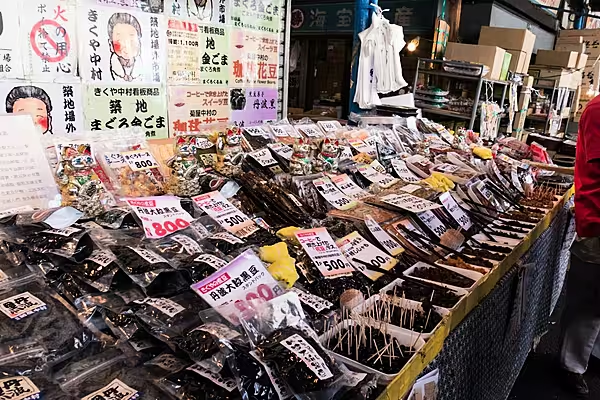The doors of Tokyo’s iconic Tsukiji fish market – the world’s biggest – are set to close after more than 80 years, but maybe not for good.
Tokyo Governor Yuriko Koike recently said that the world-famous site of early-morning tuna auctions will be relocated to an area that used to house a gasworks in the Toyosu district, near Tokyo Bay. The metropolitan government plans to then give Tsukiji, near the upmarket shopping area of Ginza, a facelift and reopen it, to tap into its name recognition, Koike said.
Koike gave no time frame for the move, saying that it would take place after discussions with those involved, but she added that the current market would be redeveloped over the next five years.
The capital’s government will also explore whether the fish market can continue to operate in Toyosu, which is equipped with state-of-the-art refrigerating and freezing capabilities. The market’s future had been in murky waters since 2001, when the city decided to move it to the Tokyo Bay site. The relocation plan was delayed because contaminated soil had to be removed from the new site – a process completed in October 2014.
In August 2016, less than a month after Koike took office, she announced a further delay to looking into the move, citing concerns over the safety of the new site and the cost of relocation. At the time, she said that she was “astonished” at the 588.4 billion yen ($5.3 billion) price tag, and has since kept citizens on tenterhooks as to her final decision.
The current market is one of the top tourist destinations in Tokyo, attracting as many as 42,000 visitors a day. The move would greatly impact not only the market as a place to visit, but also as a world-class hub for fish, according to Ted Bestor, professor of social anthropology at Harvard University and author of Tsukiji: The Fish Market at the Center of the World.
Brand Value
"You can’t duplicate something of that magnitude," Bestor said in an interview in Tokyo. "The Tokyo government may have destroyed a brand name of enormous value."
About 1,628 tonnes (3.6 million pounds) of seafood worth about 1.6 billion yen pass through the market on a typical day, according to a government pamphlet. Tsukiji handles about 480 types of seafood and 270 types of produce, yet the number of stalls has already been declining, and Toyosu’s inconvenient location may prompt some wholesalers to close their doors rather than move there, according to Bestor.
In her press conference, Koike branded the decision 'Protect Tsukiji, Make Use of Toyosu'.
The fish market has been one of several thorns in the side of the Tokyo government, which has been bogged down with planning and budgeting for the 2020 Olympics in the city. Koike has criticised the past administration, led by Prime Minister Shinzo Abe’s ruling Liberal Democratic Party, over a lack of transparency on these issues.
Tokyo Election
Koike’s scrutiny of the Olympics and the fish market helped her become one of the country’s most popular politicians, and she’s also been touted as a future premier. Tsukiji and the Olympics will be a major focus of a Tokyo assembly election, to be held early next month, Yu Uchiyama, professor of contemporary Japanese politics at the University of Tokyo, said before the recent announcement.
In a recent national poll, conducted by the Yomiuri newspaper, 46% of respondents said that the market should be moved, compared with the 29% who opposed relocation.
Hakubun Shimomura, head of the LDP’s Tokyo chapter, questioned where the money will come from to redevelop the Tsukiji site, complaining that Koike’s decision would upset current plans to develop infrastructure there in time for the Olympics.
"After moving Tsukiji, there was a plan to run the expressway underneath the site and make it into a large parking facility," Shimomura told reporters in Tokyo. "This might not be ready in time."
News by Bloomberg, edited by ESM. Click subscribe to sign up to ESM: The European Supermarket Magazine.














